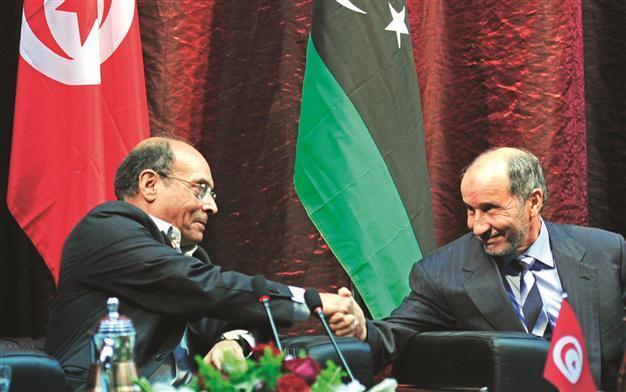Tunisia calls on Libya to unify
ISTANBUL / TRIPOLI

Libya’s National Transitional Council leader Abdul Jalil (R) shakes hands with Tunisia’s President Marzouki in this photo. Tunisia’s Ennahda Party leader Ghannouchi says they strongly support the unity with Libya. REUTERS photo
After Tunisian President Munsaf al-Marzuki made comments in Libya on the possible unification of Tunisia and Libya last week, the leader of Tunisia’s Ennahda Party Rached Ghannouchi extended support to the idea of unification Jan. 4.
Ghannouchi said they strongly supported the idea of Tunisia and Libya uniting as one country.
“Our two countries are closer to each other like never before. There are no political or cultural obstacles in front of unification,” Ghannouchi told the Anatolia news agency by phone, adding that the majority of people in both countries were of the same race, namely Muslims belonging to the Maliki tribe. “Our history and civilization are one.”
The project of unification was brought up 40 years ago, but the idea met an obstacle through former Tunisian leader Habib Burgiba, Ghannouchi said. “We made an invitation for unification again after problems occurred at the border following the revolution in Tunisia. We have now caught a great opportunity for unification, and we should not waste it.”
Ghannouchi believes the Libyans would respond positively to the invitation made by the Tunisian president, he said. “As the people and government of Tunisia, we would be happy to unite with Libya.”
Libyan army chief row grows
While Tunisia promoted a unification offer to its neighbor, Libya dealt with internal conflict over the appointment of a new military chief of staff.
Two powerful groups of former rebels who helped oust dictator Moammar Gadhafi rejected Jan. 4 the government’s choice of a new army chief, raising fresh security concerns in the war-torn country. The Coalition of Libyan Thwars (revolutionaries) and Cyrenaica Military Council, which represents militias from several parts of Libya, said they do not accept the choice of Yussef al-Mangush as chief of staff as declared by officials Jan. 3.
Cyrenaica Military Council, which represents fighters from eastern Libya, even went so far as to name its own alternative candidate to head the new national army, Associated Press reported.
“We reject anybody who is not among the list of six candidates proposed by us to the NTC [National Transitional Council],” Behlool Assid, a founder of the Coalition of Libyan Thwars, said.
The coalition represents powerful factions of former rebels from major Libyan cities such as Benghazi, Misrata and Zintan. Security concerns stem from the fact that any dispute over who should head the army will delay forming the overall force itself and integrating former rebels.
Meanwhile, the new military chief of staff said his first missions were to protect the desert nation’s vast borders and help disarm thousands of former rebels. The country’s fledgling military faces huge obstacles, including rebuilding its bases and purchasing new equipment, al-Mangush told reporters in the capital.
